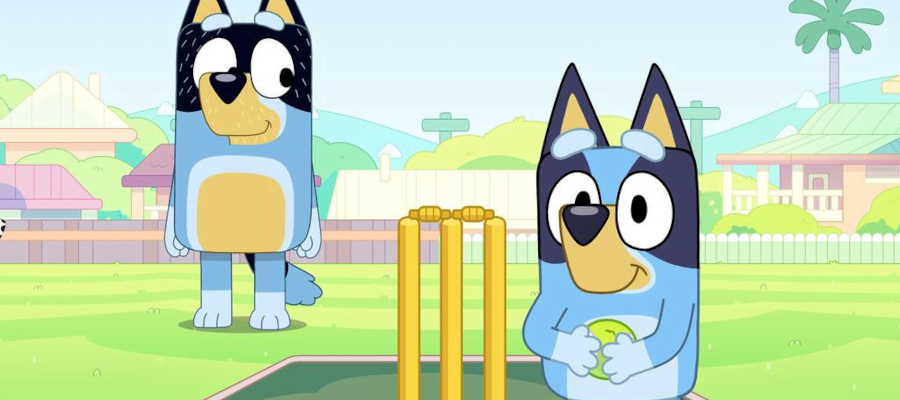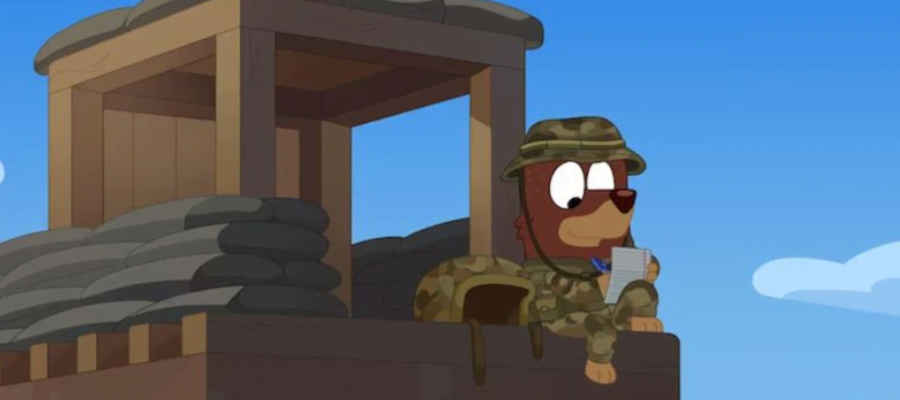The Australian character, it is said, was shaped by World War 1. The diggers, the soldiers we sent to Turkey to buy breathing room for Russia so it could push on Germany and reduce the impact on France. That is a good and comforting myth to have in which we get to do something cool and impressive and tough (partake in a war) while also thinking everyone involved is stupid (because they were) and conveniently ignore the complete lack of our own agency in it (why didn’t we say no?). It sort of crystallised the Australian character as liking and being impressed with war and death, accepting death as a potential consequence, and all that good grim military fantasism that paints us as hardworking even to the point of death, and also quite stupid in that we didn’t once consider if maybe the people we should be shooting at are the ones telling us to get shot.
But thing is, I have complicated feelings about Bluey.
If you’re not familiar with it, because you are somehow off the internet and also don’t have a four year old, Bluey is a Homestuck spin-off series about a kid named Bluey and her sister as she and her dad and mum and related family and friends get along. It is beautifully animated, charmingly expressive, deeply resonant, wholesome in ways its genre often struggles to express, and filled to the brim with thoughtful, attentive character work. In the ways that a kid’s cartoon show can be good, it is great.
This isn’t some sort of ‘waiting for the backhand’ way of things, like, not ‘it’s good for,’ or ‘it’s good but,’ or some secret interpretation thing. Bluey is just a really impressively well-made version of what it is and it underscores how many things like it do not exist and are often making media for children without the same mindset that these shows can be good.
But Bluey is also a show that deserves attention for how it is Australian. How exceptionally Australian it is. The characters all have Australian accents, as voiced by Australian accents. They reference Australian versions of things, Australian buses and trains, Australian wildlife, Australian sports, Australian school structures, Australian public works, Australian music, Australian infrastructure. It is a very Australian series.
In the episode that earns a lot of critical acclaim, Cricket, there is a shot of one of the dog’s dads, in what is probably Dog Afghanistan, partaking in the Dog war against Dog terror that involves killing a lot of brown civilians to no meaningful end.
This isn’t my observation. I knew about this before I ever saw Cricket, from the poem by Omar Sakr, called Bluey in the genocide. It’s a great poem, it’s a beautifully phrased piece of simple critique about the assumptions present in the work. Because this, this is where people want to put the brakes on the Australian-ness of Bluey. This is where they want to say, hey, okay, yeah, alright, we don’t know where this guy is, but if this is an Australian story about Australian characters, then where in the world that’s hot are you going to find an Australian soldier?
(The answer is the Middle East.)
It is an omnipresent normal that Australia likes our military, a service that has been called to defend Australia kinda, once, and called to other nations by the people who live there about two times and the rest of the time we’re being roped into the adventures of other empires. We are a colony that colonises, the normalised and included white-enoughs.
And this is part of the thing with Bluey, the complication of the Australian-ness of it all. Because like, this is a show for four year olds. This is a show that nonetheless, represents a kid’s interest in army, and makes the very realistic point that the kid’s interest in army is tied to that kid’s dad being in the army. That is extremely Australian, too. And then, while we’re accepting all these obvious things that are obviously about Australia and the obvious followup, that’s where we jerk to a halt.
Because we know we don’t want to.
Like, this dog being in the Middle East brings with it a lot of assumptions about the real world. This implies that there’s a Dog 9/11. It implies there’s a Dog Financial Crisis. It implies that there’s Dog Curtin Line and Dog Coolies and Dog Skeletons from Chinese Dogs underneath the Dog Sugarcane fields just an hour’s drive from Bluey’s House.
And like, that’s a bummer! That’s a bummer to think about! That’s not how we like to think of our history. We were crystallised by the Diggers, but only the good bits, only the bits that weren’t about a willingness to go and kill people who didn’t care for no good reason! It’s a better crystallising event than, say, the Eureka Stockade, where we fought against police trying to crack down on and control workers (and we burned down Chinese hotels) or the story of the Kelly Gang, where we fought against police abusing and controlling the poor. The crystallisation of Australian-ness is instead about the diggers.
About our military.
The military that reached across our country and has stories in it like the time we rioted against American soldiers with whom we were allied. Stories like the time we claimed someone was too European to avoid the draft, stories like the sinking of the Centaur, which was a hospital ship. Stories like Billy Hughes being racist at the treaty of Versailles, literally a subservient agent of racism for the community of powers above him.
We think of our military as normal, and not that bad, just like we think of ourselves as normal, and not that bad. We will always have the example of the empires we serve as being worse, so whatever we did is not so bad, because we’re not like those people we are working for and whose orders we follow. They’re the real bastards. They’re the ones who are benefitting from all of this. Right? We’re not so bad, we’re just doing what we’re told and really, we’re not even getting that much out of our obedience, right?
Happy Anzac Day.

